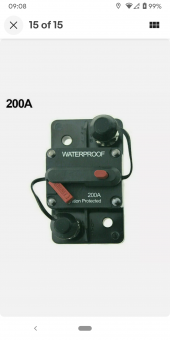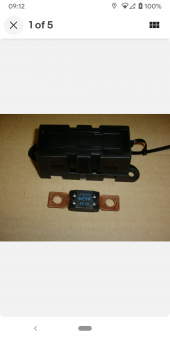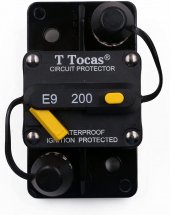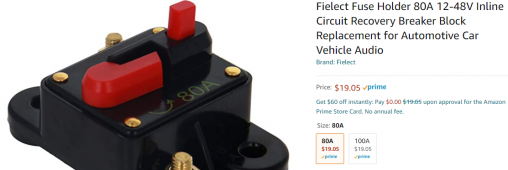clarkpeacock
New Member
- Joined
- Jun 6, 2020
- Messages
- 83
Hi all
Thought I would just share this in case it helps save a little time for anyone else!
I have had problems recently with my Victron Multiplus 24/3000 repeatedly going into low voltage shutdown when driven fairly hard - circa 80 Amps for 2-3 minutes while the washing machine heater is running. Less than 2000 watts, so well within its capabilities.
After much checking and tearing out of non existent hair, it turned out to be the 200A resettable Circuit breaker - 26V input, 16V output, and it wasn't even getting very hot! Once the Multiplus shut down, voltage was restored, washing machine restarted, and the cycle begins again.
I have now replaced the breaker with a 200A mega fuse - problem solved.
I have read before that these cheap circuit breakers are not very good, and I can now agree! Throw them away and get a decent fuse instead ?
Here's the offending article

Now replaced with this

Thought I would just share this in case it helps save a little time for anyone else!
I have had problems recently with my Victron Multiplus 24/3000 repeatedly going into low voltage shutdown when driven fairly hard - circa 80 Amps for 2-3 minutes while the washing machine heater is running. Less than 2000 watts, so well within its capabilities.
After much checking and tearing out of non existent hair, it turned out to be the 200A resettable Circuit breaker - 26V input, 16V output, and it wasn't even getting very hot! Once the Multiplus shut down, voltage was restored, washing machine restarted, and the cycle begins again.
I have now replaced the breaker with a 200A mega fuse - problem solved.
I have read before that these cheap circuit breakers are not very good, and I can now agree! Throw them away and get a decent fuse instead ?
Here's the offending article

Now replaced with this

Last edited:




